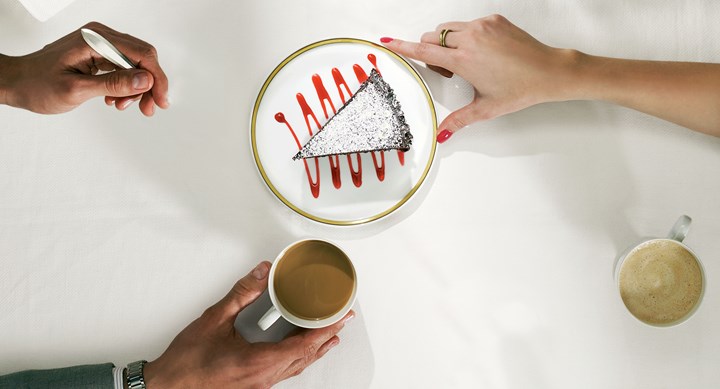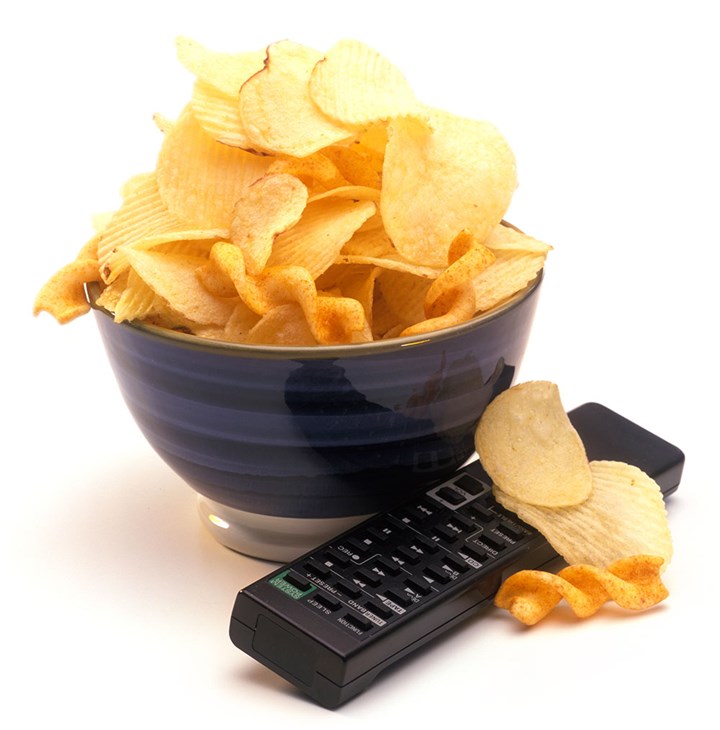Imagine you’re out with your mates when one of them orders nachos. You weren’t hungry, but suddenly you’re wolfing down cheese-laden tortilla chips with the casual abandon of a drunken uni student. What’s wrong with you? Nothing. Science shows that, even if you don’t realise it, your eating habits are affected by the people around you.
DANGER ZONE #1 – with mates at a bar
Sure, you’re your own man – just not around your mates. A study in the journal Appetite suggests that guys can down almost 20 per cent more kilojoules when they eat with same-sex friends than when they dine solo. It’s about what others are doing, says psychologist Dr Sarah-Jeanne Salvy. “If your crew is eating wings and wedges, chances are you’ll do the same.” Guys also tend to be competitive, even with wedges.
ESCAPE IT
Before you order, say you a want a grilled chicken salad. Some guys may hassle you, others will consider emulating you. “Making public your decision to eat healthy is the first step to changing your behaviour and perhaps that of the guys around you,” Salvy says.
DANGER ZONE #2 – out of a date
Resist the primal urge to order the 300-gram T-bone. A study from Indiana University of Pennsylvania found men who ate with women bought an average of 4769 kilojoules worth of food, versus 3600kJ when they ate with guys. “Men may be trying to prove their masculinity around women by buying more kilojoules,” says study author Dr Marci Cottingham.
ESCAPE IT
Show her you’re a high-level primate by ordering with your brain, not your hormones. On a first date? Try sharing an entrée and adding a salad. Just make sure you take her somewhere classy: people who eat in restaurants that have dim lights and soft music consume fewer kilojoules than those eating in the fluorescent glare typical of many franchises, according to a study in Psychological Reports.
DANGER ZONE #3 – watching TV alone
Eating while watching the box solo can be even more perilous for your belly than eating at the bar with your mates. One study from the University of Massachusetts Amherst found that eating in front of the TV can bump up your intake of high-kilojoule fare by as much as 71 per cent. Even worse: “Your brain subconsciously associates food with screen time, so you train yourself to crave kilojoules when you sit on the couch,” says dietitian Dawn Jackson Blatner, author of The Flexitarian Diet. Soon you’ll find yourself munching out of habit, not hunger.
ESCAPE IT
First, turn off those distractions. Then savour your food; this improves satiety, says sports nutritionist Christopher Mohr. And use real plates, not take-away containers. Cornell University researchers found that paper plates and plastic cups make people feel as if they’re eating snacks, so they may be more likely to have a “real meal” later. If you must snack in front of a screen, eat pistachios. “Breaking open the shells slows you down and leaves a visual reminder of how much you’ve already eaten,” Mohr says.
DANGER ZONE #4 – at home with family
Being home doesn’t seem dangerous: you’re cooking and eating at the table, and saving leftovers. But none of that helps if you can easily reach for seconds. In the Cornell study, men who set serving bowls on a side counter consumed up to 35 per cent less than those who put the food on the table. The less effort we expend, the less we keep track of our eating.
ESCAPE IT
Leave the family-style pasta and chicken platters in the kitchen; bringing them to the table makes second and third helpings too easy, says Blatner. Also, make a pact with yourself to eat only what’s on your own plate (keep your mitts off the family’s plates). Finally, try to orchestrate meals so the healthiest items are served first. In a study at the University of Leeds, men who began a meal with a salad consumed about 20 per cent fewer kilojoules than those who began with garlic bread.
DANGER ZONE #5 – at a party
Sometimes eating healthily can be socially awkward. In a study from the University of Scranton, participants were asked to rate characteristics of people who ate either pies or oatmeal for breakfast. The pie eaters were perceived as more humorous and less boring. “Showing more self-control than others – even if it’s just making healthy food choices – can increase the chances of a relationship conflict,” says psychology researcher Dr Julie Exline.
ESCAPE IT
People pleasers need to be especially aware, says Exline. “You may go out of your way to eat more than you normally would in order to make others feel comfortable.” Try this bait-and-switch tactic: compliment the food and talk about how great everything looks while filling your plate with healthy options, like fresh produce and protein. It will seem like you’re indulging, not counting kilojoules.
Want some serious help to stack on muscle and torch fat? You’ll find more workouts, recipes and motivation boosters in MH TRANSFORM, on sale now.















